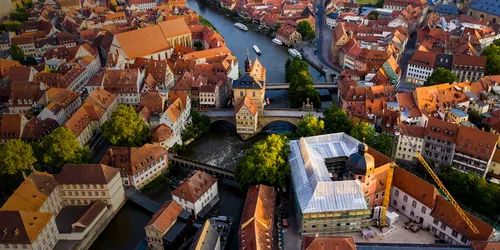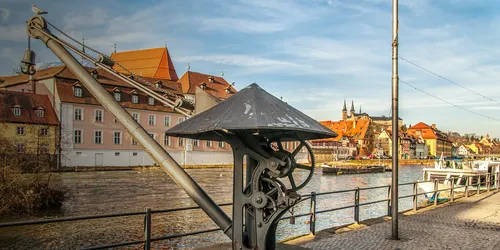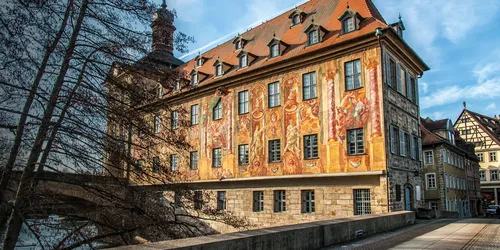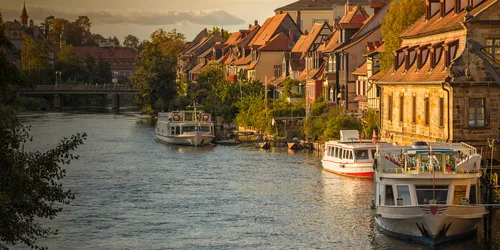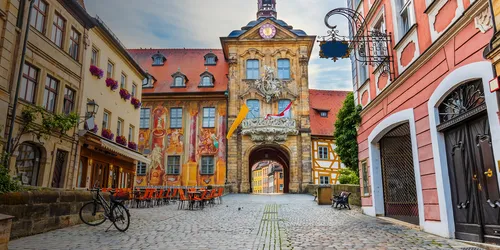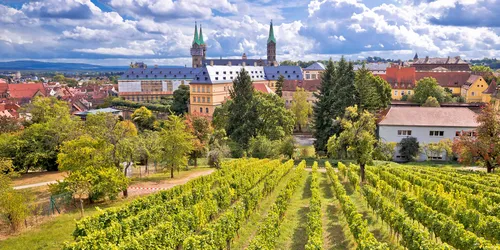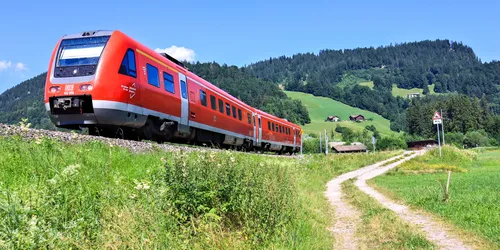Accompany Simon to Bamberg as he explores the city with DB Regio Bayern and the Inspirator - in the video you can see how he tastes the famous Bamberg Hörnla and enjoys the charming atmosphere of "Bamberch".
Bamberg: An excursion with Alsatian charm in the centre of Franconia!
Bamberg is part of the UNESCO World Heritage Site and is just waiting to be discovered by you. With historical beauty, cultural and culinary highlights, the old town is the ideal destination for a day trip and just a short walk from the train station where you will arrive if you are travelling to Bamberg by train.
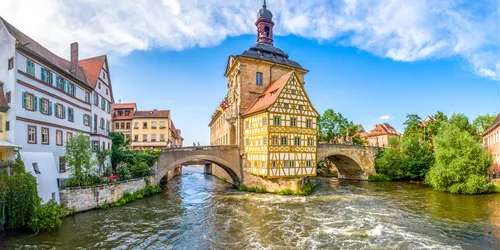
Your journey of discovery through "Bamberch", as the locals affectionately call it, begins at the railway station, which is located north-east of the so-called Gardeners' Town. This is one of three historic districts - Bergstadt, Inselstadt and Gärtnerstadt - all of which are recognised as UNESCO World Heritage Sites.
Gärtnerstadt: an oasis of urban agriculture and historic residential culture
The Gardeners' Town is a living testimony to urban agriculture and historical residential culture with its unique gardeners' and crocheters' houses, in whose spacious gardens vegetables and fruit were traditionally grown - a practice that continues to this day. Liquorice, the basic ingredient for liquorice, has been grown here since the Middle Ages. The medicinal plant is also grated and sold as tea. Bambergers are real liquorice graters.
The perfect start to a city tour of Bamberg
On your Bamberg excursion, stroll from the railway station along Luitpoldstraße and Obere Königstraße. Continue to the Kettenbrücke bridge, which takes you right into the historic island town, which, as the name suggests, lies on an island between two arms of the Regnitz river. The island town, sometimes also known as Bürgerstadt, is characterised by small, individual shops and is also home to the Natural History Museum and St. Martin's Church. This Catholic parish church is built in the Baroque style and features a mock dome designed by Giovanni Francesco Marchini and a Pietá from the beginning of the 14th century as special highlights.
Visit to the Old Town Hall
On the southern border of the island city to the mountain city, in the middle of the Regnitz arm, you will come across the city's landmark on your Bamberg excursion: the Old Town Hall. Legend has it that in the 15th century, the bishop would not allow the people of Bamberg to build it, so they drove piles into the river and erected the impressive landmark on this artificial island. The colourful façade, which is decorated with frescoes, is particularly striking. Today, the Old Town Hall houses the prestigious Rococo Hall and the Ludwig Collection, an impressive porcelain collection spanning more than 300 years of European porcelain art and including works from famous manufactories such as Meissen, Vienna and Nymphenburg. The collection takes its name from the married couple Peter and Irene Ludwig, who are known as art collectors and patrons and donated a significant part of their porcelain collection to the city of Bamberg.
Important information
The Old Town Hall and the Ludwig Collection are currently closed until further notice due to ongoing renovation work. A selection of precious porcelain and faience awaits you in the "Courtly Encounters" exhibition in the New Residence. This runs until June 2025 and offers you a fascinating insight into the world of courtly art and culture.
Impressive architecture in the mountain town
Your excursion to Bamberg continues over the bridge to the west and into the third historic district of Bamberg - the Bergstadt. The oldest part of Bamberg sits majestically on a hill and is known for its magnificent medieval structures and impressive ensemble of churches, monasteries and manor houses.
The entire old town of Bamberg - i.e. the hill, island and gardener's town - with its numerous monuments was declared a UNESCO World Heritage Site in 1993. The visitor centre provides a vivid summary of everything. From the Old Town Hall, you can reach the visitor centre on your Bamberg excursion by walking south on Geyerswörthplatz and crossing the Regnitz again via the Untere Mühlbrücke. Extra tip for the perfect photo motif: from the Geyerswörthsteg, right next to the Mühlbrücke, you have the perfect view of the Old Town Hall.
And another culinary tip: after visiting the town hall, plan a stopover at Café Hörnla, at Lugbank 10, and try the traditional Bamberg Hörnla. The butter croissants have been around in the imperial and episcopal city of Bamberg since the 14th century - and nobody in Bamberg would ever think of calling them "croissants".
Bamberg's imperial cathedral: the centrepiece of the world cultural heritage site
We continue along the Karolinenstraße into the centre of the hill town and reach the cathedral square, which brings together architectural styles from all eras. The centrepiece of the World Heritage Site, the four-towered Bamberg Imperial Cathedral of St. Peter and St. George, is enthroned here. This architectural jewel, completed and consecrated in the 13th century, impresses with its impressive mixture of Romanesque and Gothic style features.
Mysterious equestrian sculpture from the Middle Ages
Inside the cathedral is one of the most famous sculptures of the Middle Ages, the Bamberg Horseman. This mysterious work of art, whose exact origin and meaning are unknown, is the oldest completely preserved medieval sculpture of a horseman in Germany. Take a moment to take in the magnificent building and the iconic horseman. Right next to the cathedral is the Alte Hofhaltung, a building complex where the Bamberg bishops used to reside.
Bamberg's breweries
If you start to work up an appetite on this excursion and want to eat authentically, you'll be spoilt for choice in Bamberg. There are still eleven active breweries in the city alone, such as the Klosterbräu right by the river or the Schlenkerla in the famous Sandstraße with its picturesque half-timbered houses from the Middle Ages. In addition to the Franconian classics on the menu, both pubs also offer the infamous smoked beer, which you should definitely try! This dark, bottom-fermented Märzen beer is characterised by its unique smoky flavour, which is created by smoking the brewing malt. It is traditionally - and exclusively - drunk from the "Seidla", a half-litre mug.
The Franconian cuisine, which has its very own character in Bamberg, entices with traditional dishes such as the "Bamberg onion" - an onion stuffed with minced meat in beer sauce and, of course, the famous "Franconian bratwurst".
Relaxing in the rose garden of the New Residence
After the sumptuous meal from the Franconian kitchen, a short walk in the beautiful rose garden of the Neue Residenz will do you good. With over 4,500 roses, impressive sandstone figures and a breathtaking view of the city, the rose garden of the New Residence offers an idyllic oasis above the city.
Return to the railway station with a view of Little Venice
Now it's time to think about the journey home from your Bamberg excursion: on the way back to the railway station, we recommend strolling from the Neue Residenz along Kasernstraße to the banks of the Regnitz and from there heading north-west to St Mark's Bridge. From here you have a marvellous view of the row of houses opposite, Little Venice, the former fishermen's settlement in Bamberg's island town. The fishermen's and boatmen's houses are not only reminiscent of the Italian lagoon city due to their proximity to the water, the Venetian flair is also emphasised by authentic gondolas - steered by real Venetian gondoliers. A wonderful sight to bring the day to a slow close.
No matter how often you visit "Bamberch": You always discover a new facet on a Bamberg excursion. Architectural splendour, its charming flair and hearty cuisine, all just a train ride away.
Arrival
Ludwigstraße 6
96052 Bamberg
Bamberg
Our tip: Please make sure to check your train connection and the expected capacity before you start your journey.
